Comprehensive Analysis: Legislation and Ethics in Travel and Tourism
VerifiedAdded on 2020/06/04
|16
|5088
|323
Report
AI Summary
This report provides a comprehensive analysis of the legal and ethical considerations within the travel and tourism sector. It begins by differentiating between ABTA and ATOL, explaining their roles in consumer protection and licensing. The report then explores international conventions regulating travel by land, sea, and air, detailing relevant legislation concerning health, safety, and security for both employees and visitors. It further examines contract and consumer protection legislation, outlining the rights and responsibilities of travel providers and consumers. The report also addresses ethical dilemmas faced by the industry, including corporate social responsibility (CSR) policies. Through case studies, such as the LAH example, the report highlights the practical implications of these regulations and ethical considerations, providing a thorough overview of the subject matter.
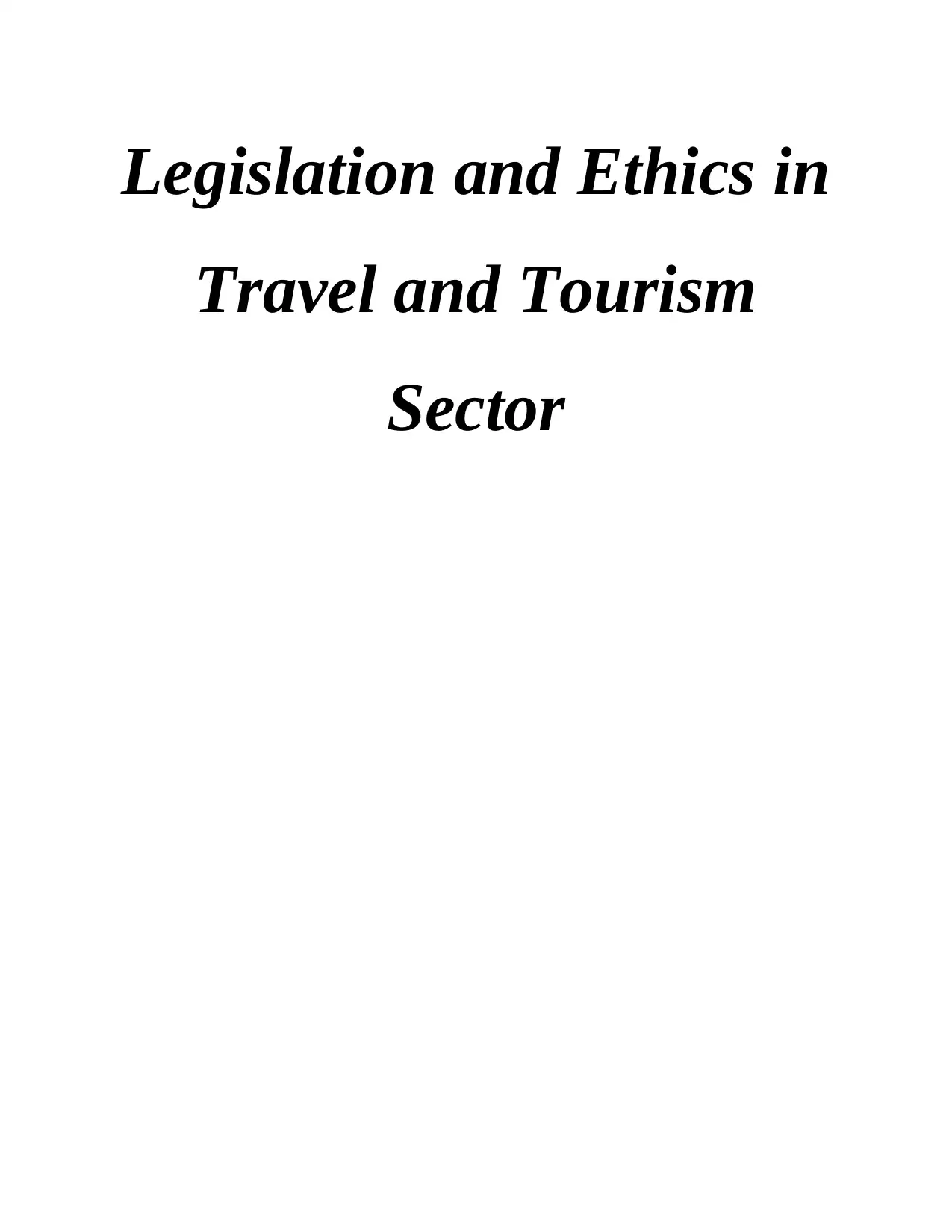
Legislation and Ethics in
Travel and Tourism
Sector
Travel and Tourism
Sector
Paraphrase This Document
Need a fresh take? Get an instant paraphrase of this document with our AI Paraphraser
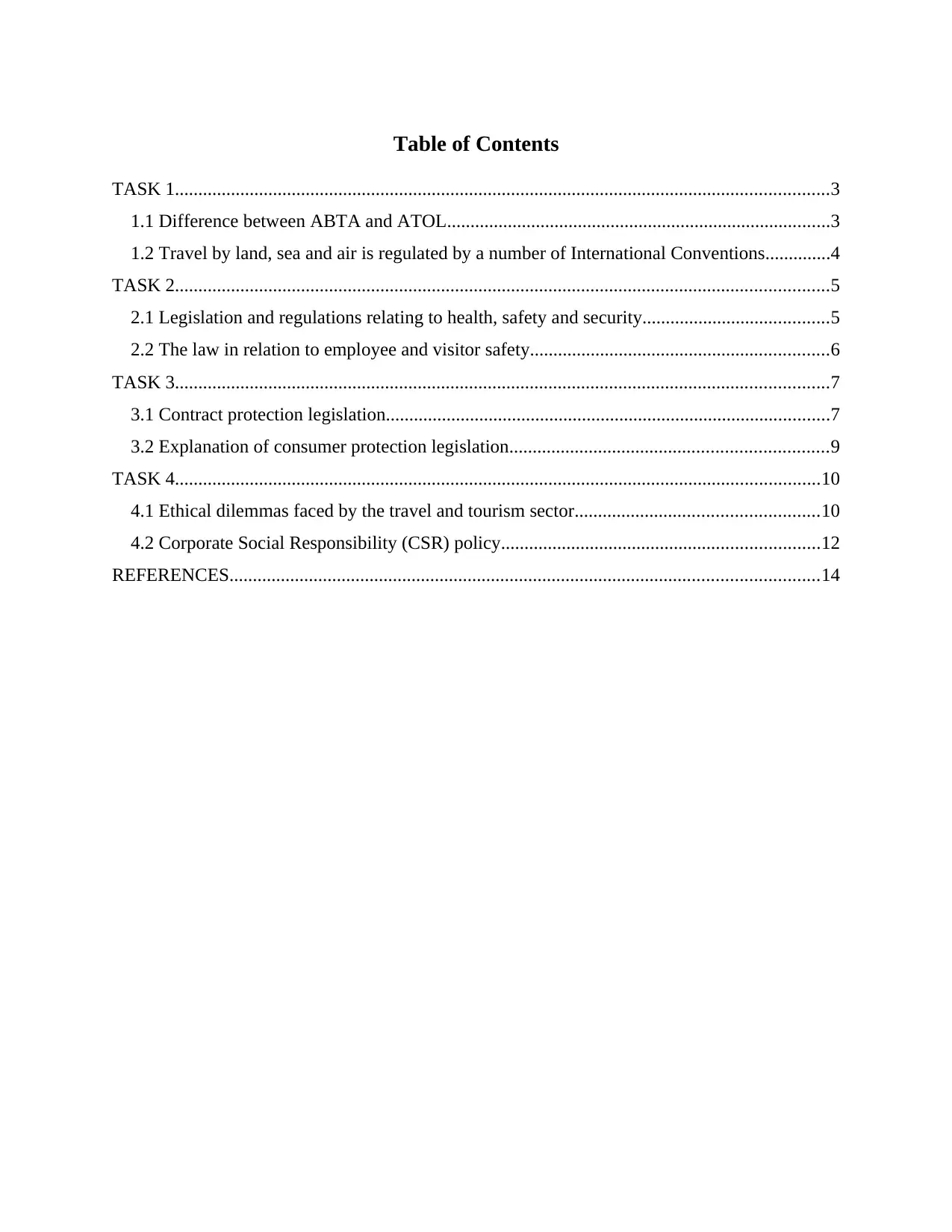
Table of Contents
TASK 1............................................................................................................................................3
1.1 Difference between ABTA and ATOL..................................................................................3
1.2 Travel by land, sea and air is regulated by a number of International Conventions..............4
TASK 2............................................................................................................................................5
2.1 Legislation and regulations relating to health, safety and security........................................5
2.2 The law in relation to employee and visitor safety................................................................6
TASK 3............................................................................................................................................7
3.1 Contract protection legislation...............................................................................................7
3.2 Explanation of consumer protection legislation....................................................................9
TASK 4..........................................................................................................................................10
4.1 Ethical dilemmas faced by the travel and tourism sector....................................................10
4.2 Corporate Social Responsibility (CSR) policy....................................................................12
REFERENCES..............................................................................................................................14
TASK 1............................................................................................................................................3
1.1 Difference between ABTA and ATOL..................................................................................3
1.2 Travel by land, sea and air is regulated by a number of International Conventions..............4
TASK 2............................................................................................................................................5
2.1 Legislation and regulations relating to health, safety and security........................................5
2.2 The law in relation to employee and visitor safety................................................................6
TASK 3............................................................................................................................................7
3.1 Contract protection legislation...............................................................................................7
3.2 Explanation of consumer protection legislation....................................................................9
TASK 4..........................................................................................................................................10
4.1 Ethical dilemmas faced by the travel and tourism sector....................................................10
4.2 Corporate Social Responsibility (CSR) policy....................................................................12
REFERENCES..............................................................................................................................14
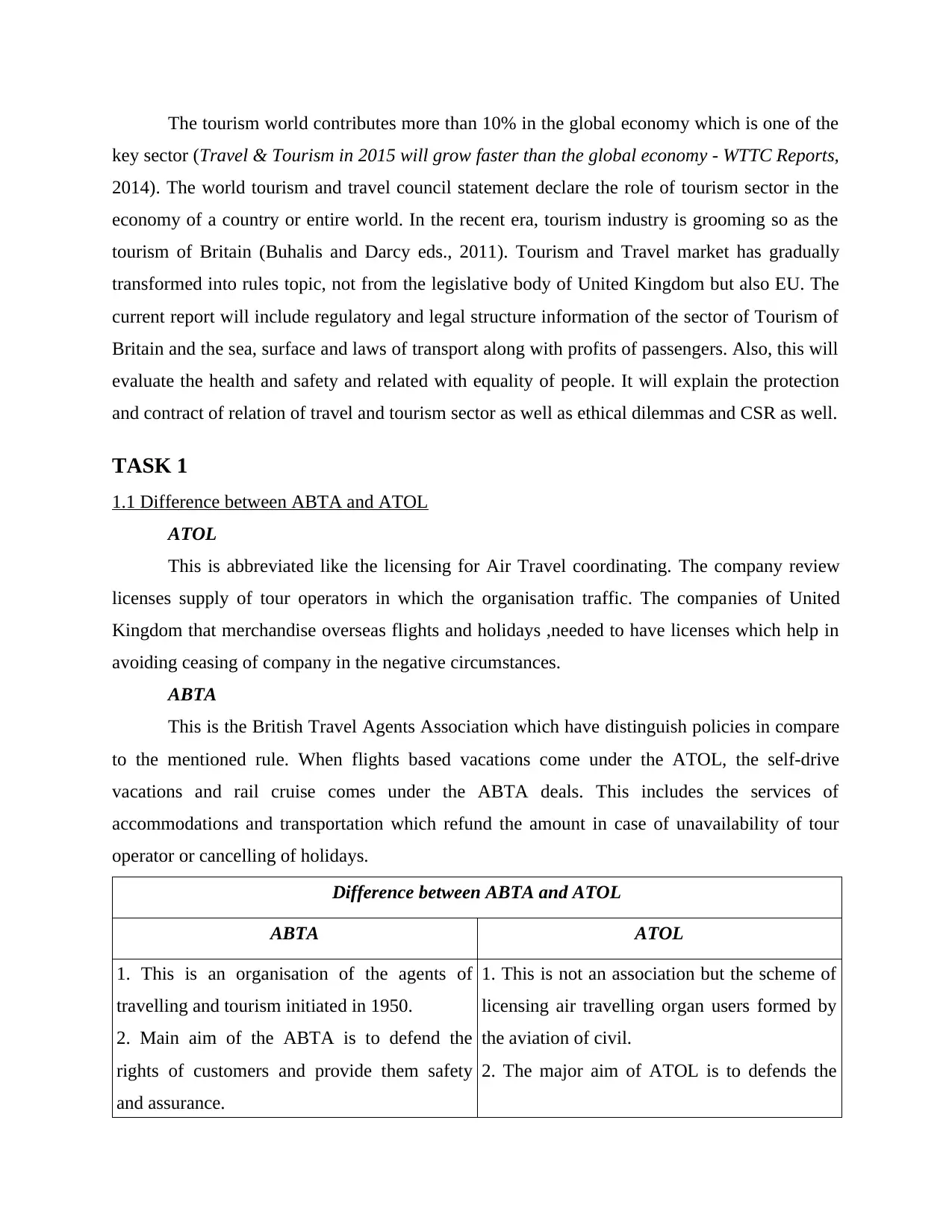
The tourism world contributes more than 10% in the global economy which is one of the
key sector (Travel & Tourism in 2015 will grow faster than the global economy - WTTC Reports,
2014). The world tourism and travel council statement declare the role of tourism sector in the
economy of a country or entire world. In the recent era, tourism industry is grooming so as the
tourism of Britain (Buhalis and Darcy eds., 2011). Tourism and Travel market has gradually
transformed into rules topic, not from the legislative body of United Kingdom but also EU. The
current report will include regulatory and legal structure information of the sector of Tourism of
Britain and the sea, surface and laws of transport along with profits of passengers. Also, this will
evaluate the health and safety and related with equality of people. It will explain the protection
and contract of relation of travel and tourism sector as well as ethical dilemmas and CSR as well.
TASK 1
1.1 Difference between ABTA and ATOL
ATOL
This is abbreviated like the licensing for Air Travel coordinating. The company review
licenses supply of tour operators in which the organisation traffic. The companies of United
Kingdom that merchandise overseas flights and holidays ,needed to have licenses which help in
avoiding ceasing of company in the negative circumstances.
ABTA
This is the British Travel Agents Association which have distinguish policies in compare
to the mentioned rule. When flights based vacations come under the ATOL, the self-drive
vacations and rail cruise comes under the ABTA deals. This includes the services of
accommodations and transportation which refund the amount in case of unavailability of tour
operator or cancelling of holidays.
Difference between ABTA and ATOL
ABTA ATOL
1. This is an organisation of the agents of
travelling and tourism initiated in 1950.
2. Main aim of the ABTA is to defend the
rights of customers and provide them safety
and assurance.
1. This is not an association but the scheme of
licensing air travelling organ users formed by
the aviation of civil.
2. The major aim of ATOL is to defends the
key sector (Travel & Tourism in 2015 will grow faster than the global economy - WTTC Reports,
2014). The world tourism and travel council statement declare the role of tourism sector in the
economy of a country or entire world. In the recent era, tourism industry is grooming so as the
tourism of Britain (Buhalis and Darcy eds., 2011). Tourism and Travel market has gradually
transformed into rules topic, not from the legislative body of United Kingdom but also EU. The
current report will include regulatory and legal structure information of the sector of Tourism of
Britain and the sea, surface and laws of transport along with profits of passengers. Also, this will
evaluate the health and safety and related with equality of people. It will explain the protection
and contract of relation of travel and tourism sector as well as ethical dilemmas and CSR as well.
TASK 1
1.1 Difference between ABTA and ATOL
ATOL
This is abbreviated like the licensing for Air Travel coordinating. The company review
licenses supply of tour operators in which the organisation traffic. The companies of United
Kingdom that merchandise overseas flights and holidays ,needed to have licenses which help in
avoiding ceasing of company in the negative circumstances.
ABTA
This is the British Travel Agents Association which have distinguish policies in compare
to the mentioned rule. When flights based vacations come under the ATOL, the self-drive
vacations and rail cruise comes under the ABTA deals. This includes the services of
accommodations and transportation which refund the amount in case of unavailability of tour
operator or cancelling of holidays.
Difference between ABTA and ATOL
ABTA ATOL
1. This is an organisation of the agents of
travelling and tourism initiated in 1950.
2. Main aim of the ABTA is to defend the
rights of customers and provide them safety
and assurance.
1. This is not an association but the scheme of
licensing air travelling organ users formed by
the aviation of civil.
2. The major aim of ATOL is to defends the
⊘ This is a preview!⊘
Do you want full access?
Subscribe today to unlock all pages.

Trusted by 1+ million students worldwide
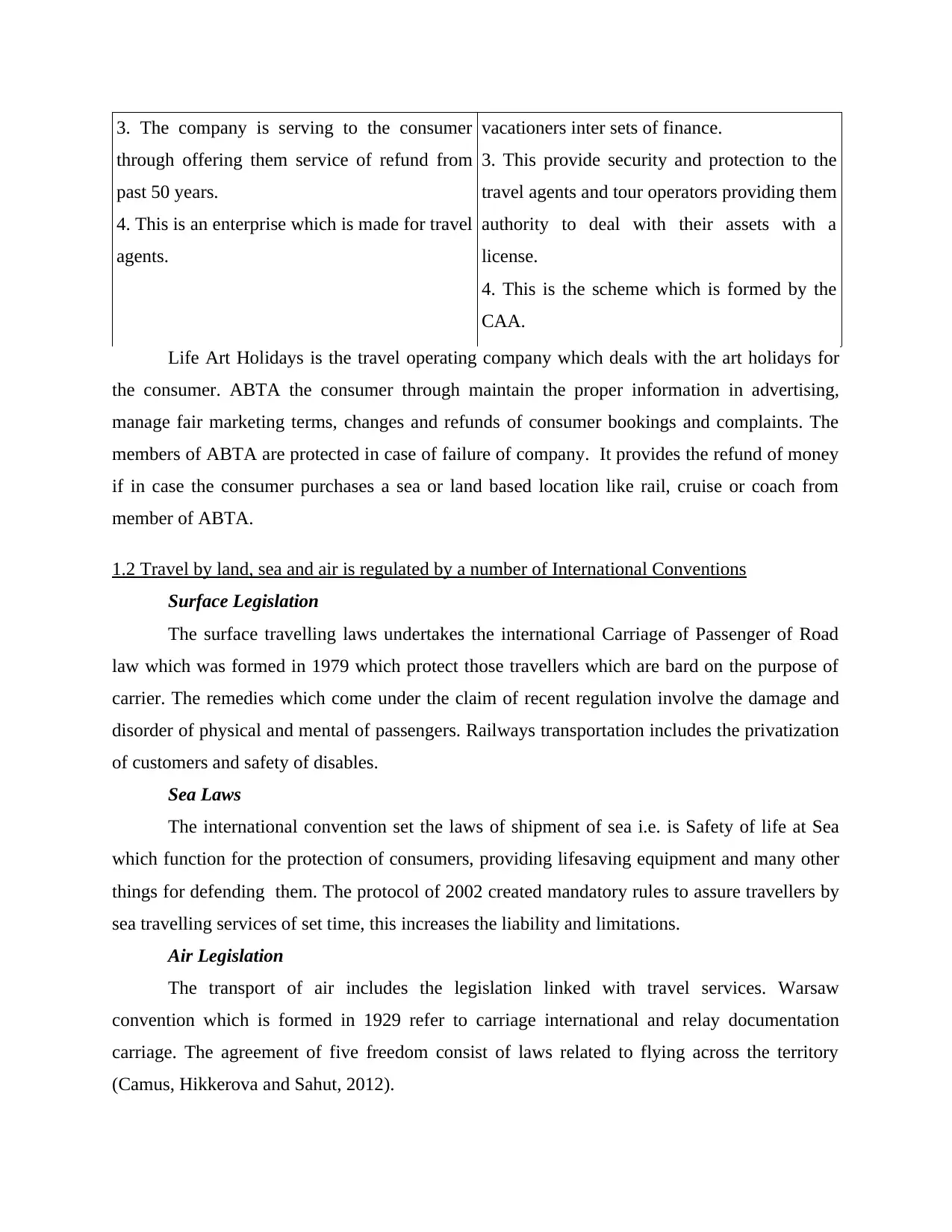
3. The company is serving to the consumer
through offering them service of refund from
past 50 years.
4. This is an enterprise which is made for travel
agents.
vacationers inter sets of finance.
3. This provide security and protection to the
travel agents and tour operators providing them
authority to deal with their assets with a
license.
4. This is the scheme which is formed by the
CAA.
Life Art Holidays is the travel operating company which deals with the art holidays for
the consumer. ABTA the consumer through maintain the proper information in advertising,
manage fair marketing terms, changes and refunds of consumer bookings and complaints. The
members of ABTA are protected in case of failure of company. It provides the refund of money
if in case the consumer purchases a sea or land based location like rail, cruise or coach from
member of ABTA.
1.2 Travel by land, sea and air is regulated by a number of International Conventions
Surface Legislation
The surface travelling laws undertakes the international Carriage of Passenger of Road
law which was formed in 1979 which protect those travellers which are bard on the purpose of
carrier. The remedies which come under the claim of recent regulation involve the damage and
disorder of physical and mental of passengers. Railways transportation includes the privatization
of customers and safety of disables.
Sea Laws
The international convention set the laws of shipment of sea i.e. is Safety of life at Sea
which function for the protection of consumers, providing lifesaving equipment and many other
things for defending them. The protocol of 2002 created mandatory rules to assure travellers by
sea travelling services of set time, this increases the liability and limitations.
Air Legislation
The transport of air includes the legislation linked with travel services. Warsaw
convention which is formed in 1929 refer to carriage international and relay documentation
carriage. The agreement of five freedom consist of laws related to flying across the territory
(Camus, Hikkerova and Sahut, 2012).
through offering them service of refund from
past 50 years.
4. This is an enterprise which is made for travel
agents.
vacationers inter sets of finance.
3. This provide security and protection to the
travel agents and tour operators providing them
authority to deal with their assets with a
license.
4. This is the scheme which is formed by the
CAA.
Life Art Holidays is the travel operating company which deals with the art holidays for
the consumer. ABTA the consumer through maintain the proper information in advertising,
manage fair marketing terms, changes and refunds of consumer bookings and complaints. The
members of ABTA are protected in case of failure of company. It provides the refund of money
if in case the consumer purchases a sea or land based location like rail, cruise or coach from
member of ABTA.
1.2 Travel by land, sea and air is regulated by a number of International Conventions
Surface Legislation
The surface travelling laws undertakes the international Carriage of Passenger of Road
law which was formed in 1979 which protect those travellers which are bard on the purpose of
carrier. The remedies which come under the claim of recent regulation involve the damage and
disorder of physical and mental of passengers. Railways transportation includes the privatization
of customers and safety of disables.
Sea Laws
The international convention set the laws of shipment of sea i.e. is Safety of life at Sea
which function for the protection of consumers, providing lifesaving equipment and many other
things for defending them. The protocol of 2002 created mandatory rules to assure travellers by
sea travelling services of set time, this increases the liability and limitations.
Air Legislation
The transport of air includes the legislation linked with travel services. Warsaw
convention which is formed in 1929 refer to carriage international and relay documentation
carriage. The agreement of five freedom consist of laws related to flying across the territory
(Camus, Hikkerova and Sahut, 2012).
Paraphrase This Document
Need a fresh take? Get an instant paraphrase of this document with our AI Paraphraser
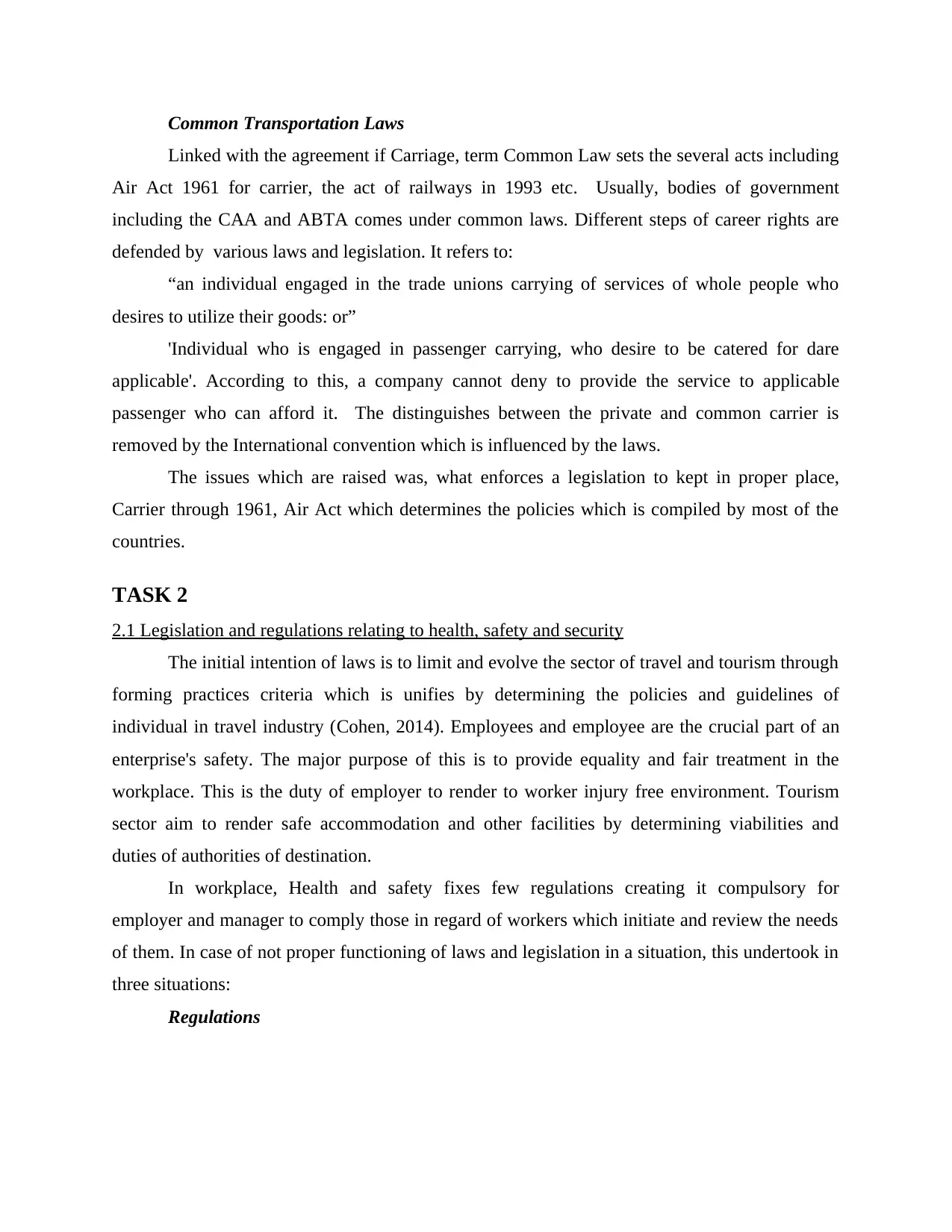
Common Transportation Laws
Linked with the agreement if Carriage, term Common Law sets the several acts including
Air Act 1961 for carrier, the act of railways in 1993 etc. Usually, bodies of government
including the CAA and ABTA comes under common laws. Different steps of career rights are
defended by various laws and legislation. It refers to:
“an individual engaged in the trade unions carrying of services of whole people who
desires to utilize their goods: or”
'Individual who is engaged in passenger carrying, who desire to be catered for dare
applicable'. According to this, a company cannot deny to provide the service to applicable
passenger who can afford it. The distinguishes between the private and common carrier is
removed by the International convention which is influenced by the laws.
The issues which are raised was, what enforces a legislation to kept in proper place,
Carrier through 1961, Air Act which determines the policies which is compiled by most of the
countries.
TASK 2
2.1 Legislation and regulations relating to health, safety and security
The initial intention of laws is to limit and evolve the sector of travel and tourism through
forming practices criteria which is unifies by determining the policies and guidelines of
individual in travel industry (Cohen, 2014). Employees and employee are the crucial part of an
enterprise's safety. The major purpose of this is to provide equality and fair treatment in the
workplace. This is the duty of employer to render to worker injury free environment. Tourism
sector aim to render safe accommodation and other facilities by determining viabilities and
duties of authorities of destination.
In workplace, Health and safety fixes few regulations creating it compulsory for
employer and manager to comply those in regard of workers which initiate and review the needs
of them. In case of not proper functioning of laws and legislation in a situation, this undertook in
three situations:
Regulations
Linked with the agreement if Carriage, term Common Law sets the several acts including
Air Act 1961 for carrier, the act of railways in 1993 etc. Usually, bodies of government
including the CAA and ABTA comes under common laws. Different steps of career rights are
defended by various laws and legislation. It refers to:
“an individual engaged in the trade unions carrying of services of whole people who
desires to utilize their goods: or”
'Individual who is engaged in passenger carrying, who desire to be catered for dare
applicable'. According to this, a company cannot deny to provide the service to applicable
passenger who can afford it. The distinguishes between the private and common carrier is
removed by the International convention which is influenced by the laws.
The issues which are raised was, what enforces a legislation to kept in proper place,
Carrier through 1961, Air Act which determines the policies which is compiled by most of the
countries.
TASK 2
2.1 Legislation and regulations relating to health, safety and security
The initial intention of laws is to limit and evolve the sector of travel and tourism through
forming practices criteria which is unifies by determining the policies and guidelines of
individual in travel industry (Cohen, 2014). Employees and employee are the crucial part of an
enterprise's safety. The major purpose of this is to provide equality and fair treatment in the
workplace. This is the duty of employer to render to worker injury free environment. Tourism
sector aim to render safe accommodation and other facilities by determining viabilities and
duties of authorities of destination.
In workplace, Health and safety fixes few regulations creating it compulsory for
employer and manager to comply those in regard of workers which initiate and review the needs
of them. In case of not proper functioning of laws and legislation in a situation, this undertook in
three situations:
Regulations
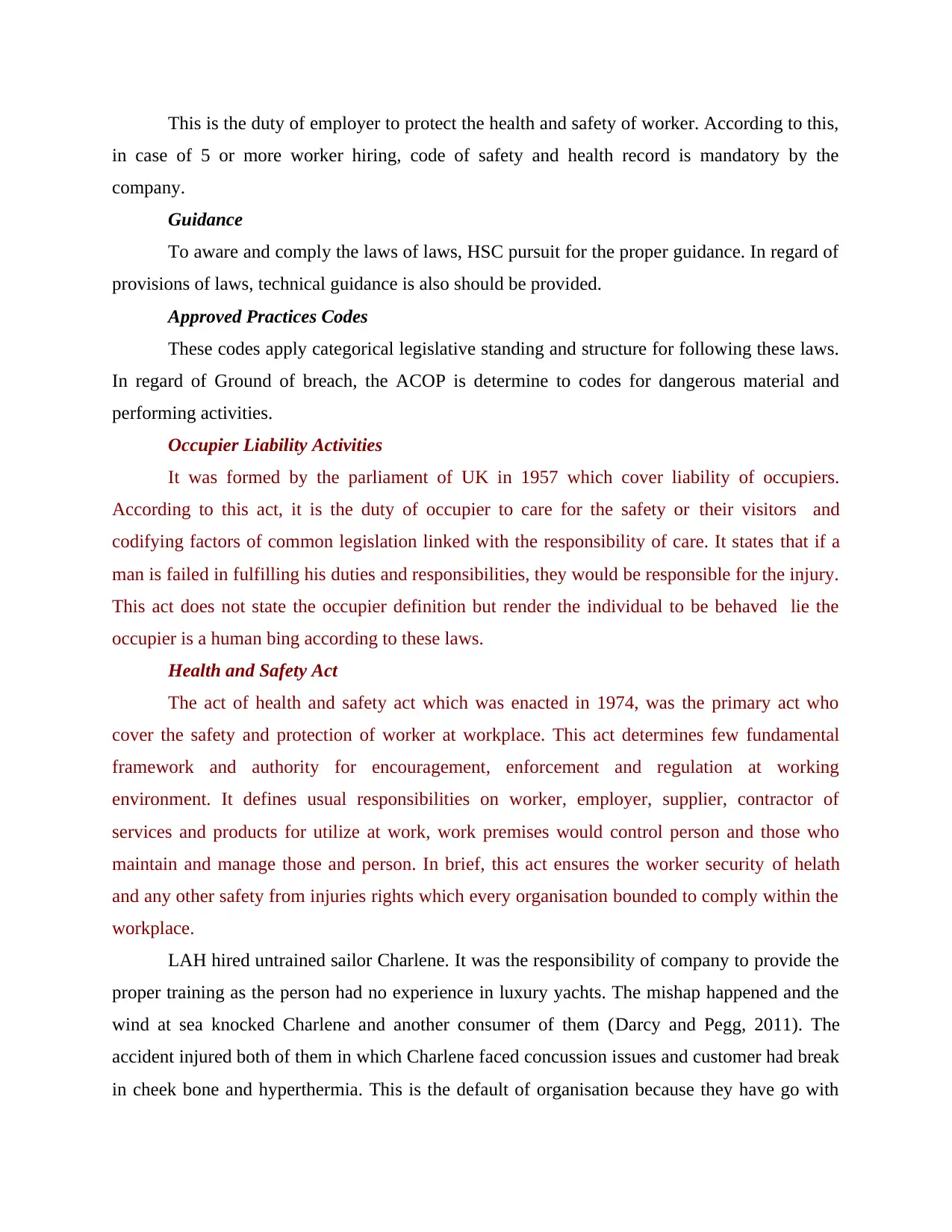
This is the duty of employer to protect the health and safety of worker. According to this,
in case of 5 or more worker hiring, code of safety and health record is mandatory by the
company.
Guidance
To aware and comply the laws of laws, HSC pursuit for the proper guidance. In regard of
provisions of laws, technical guidance is also should be provided.
Approved Practices Codes
These codes apply categorical legislative standing and structure for following these laws.
In regard of Ground of breach, the ACOP is determine to codes for dangerous material and
performing activities.
Occupier Liability Activities
It was formed by the parliament of UK in 1957 which cover liability of occupiers.
According to this act, it is the duty of occupier to care for the safety or their visitors and
codifying factors of common legislation linked with the responsibility of care. It states that if a
man is failed in fulfilling his duties and responsibilities, they would be responsible for the injury.
This act does not state the occupier definition but render the individual to be behaved lie the
occupier is a human bing according to these laws.
Health and Safety Act
The act of health and safety act which was enacted in 1974, was the primary act who
cover the safety and protection of worker at workplace. This act determines few fundamental
framework and authority for encouragement, enforcement and regulation at working
environment. It defines usual responsibilities on worker, employer, supplier, contractor of
services and products for utilize at work, work premises would control person and those who
maintain and manage those and person. In brief, this act ensures the worker security of helath
and any other safety from injuries rights which every organisation bounded to comply within the
workplace.
LAH hired untrained sailor Charlene. It was the responsibility of company to provide the
proper training as the person had no experience in luxury yachts. The mishap happened and the
wind at sea knocked Charlene and another consumer of them (Darcy and Pegg, 2011). The
accident injured both of them in which Charlene faced concussion issues and customer had break
in cheek bone and hyperthermia. This is the default of organisation because they have go with
in case of 5 or more worker hiring, code of safety and health record is mandatory by the
company.
Guidance
To aware and comply the laws of laws, HSC pursuit for the proper guidance. In regard of
provisions of laws, technical guidance is also should be provided.
Approved Practices Codes
These codes apply categorical legislative standing and structure for following these laws.
In regard of Ground of breach, the ACOP is determine to codes for dangerous material and
performing activities.
Occupier Liability Activities
It was formed by the parliament of UK in 1957 which cover liability of occupiers.
According to this act, it is the duty of occupier to care for the safety or their visitors and
codifying factors of common legislation linked with the responsibility of care. It states that if a
man is failed in fulfilling his duties and responsibilities, they would be responsible for the injury.
This act does not state the occupier definition but render the individual to be behaved lie the
occupier is a human bing according to these laws.
Health and Safety Act
The act of health and safety act which was enacted in 1974, was the primary act who
cover the safety and protection of worker at workplace. This act determines few fundamental
framework and authority for encouragement, enforcement and regulation at working
environment. It defines usual responsibilities on worker, employer, supplier, contractor of
services and products for utilize at work, work premises would control person and those who
maintain and manage those and person. In brief, this act ensures the worker security of helath
and any other safety from injuries rights which every organisation bounded to comply within the
workplace.
LAH hired untrained sailor Charlene. It was the responsibility of company to provide the
proper training as the person had no experience in luxury yachts. The mishap happened and the
wind at sea knocked Charlene and another consumer of them (Darcy and Pegg, 2011). The
accident injured both of them in which Charlene faced concussion issues and customer had break
in cheek bone and hyperthermia. This is the default of organisation because they have go with
⊘ This is a preview!⊘
Do you want full access?
Subscribe today to unlock all pages.

Trusted by 1+ million students worldwide
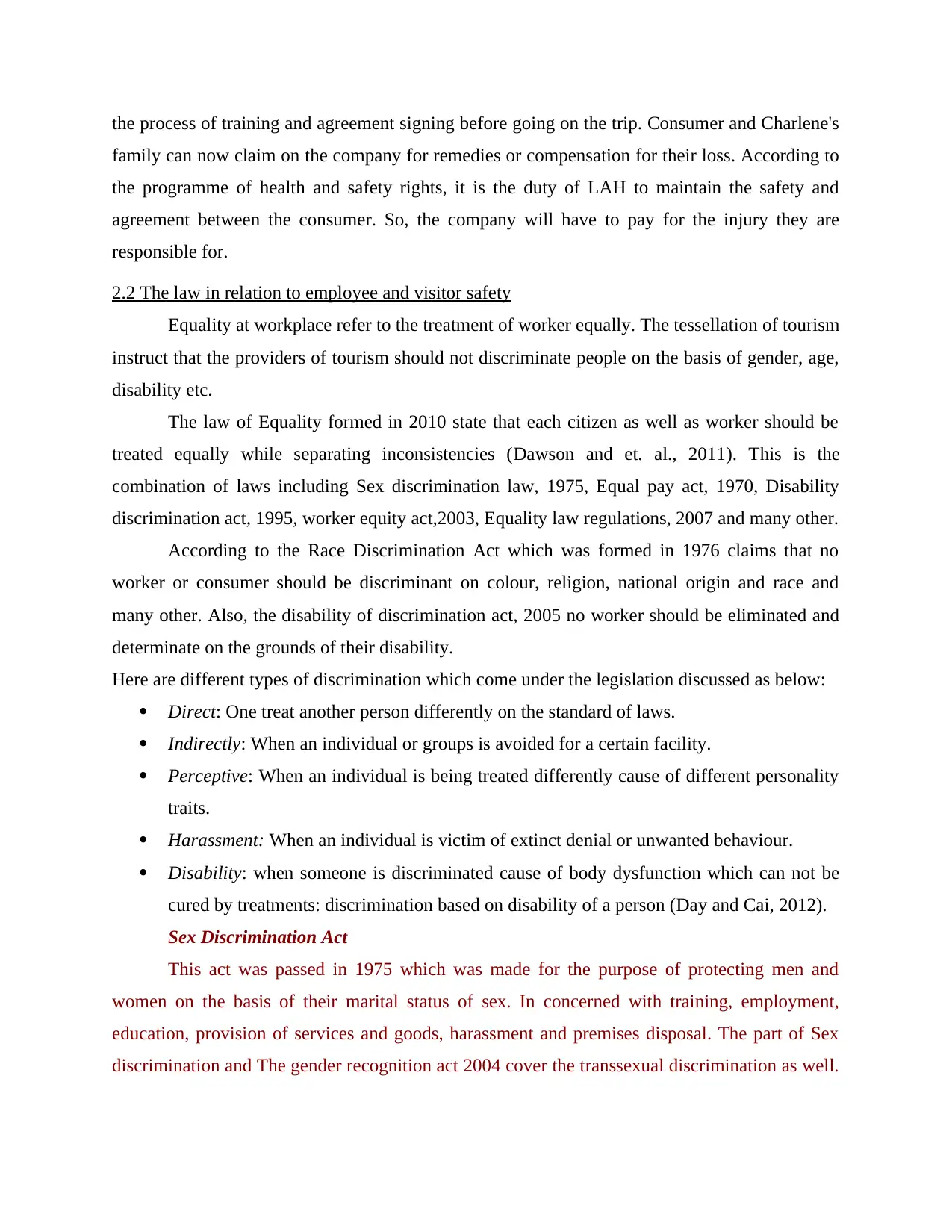
the process of training and agreement signing before going on the trip. Consumer and Charlene's
family can now claim on the company for remedies or compensation for their loss. According to
the programme of health and safety rights, it is the duty of LAH to maintain the safety and
agreement between the consumer. So, the company will have to pay for the injury they are
responsible for.
2.2 The law in relation to employee and visitor safety
Equality at workplace refer to the treatment of worker equally. The tessellation of tourism
instruct that the providers of tourism should not discriminate people on the basis of gender, age,
disability etc.
The law of Equality formed in 2010 state that each citizen as well as worker should be
treated equally while separating inconsistencies (Dawson and et. al., 2011). This is the
combination of laws including Sex discrimination law, 1975, Equal pay act, 1970, Disability
discrimination act, 1995, worker equity act,2003, Equality law regulations, 2007 and many other.
According to the Race Discrimination Act which was formed in 1976 claims that no
worker or consumer should be discriminant on colour, religion, national origin and race and
many other. Also, the disability of discrimination act, 2005 no worker should be eliminated and
determinate on the grounds of their disability.
Here are different types of discrimination which come under the legislation discussed as below:
Direct: One treat another person differently on the standard of laws.
Indirectly: When an individual or groups is avoided for a certain facility.
Perceptive: When an individual is being treated differently cause of different personality
traits.
Harassment: When an individual is victim of extinct denial or unwanted behaviour.
Disability: when someone is discriminated cause of body dysfunction which can not be
cured by treatments: discrimination based on disability of a person (Day and Cai, 2012).
Sex Discrimination Act
This act was passed in 1975 which was made for the purpose of protecting men and
women on the basis of their marital status of sex. In concerned with training, employment,
education, provision of services and goods, harassment and premises disposal. The part of Sex
discrimination and The gender recognition act 2004 cover the transsexual discrimination as well.
family can now claim on the company for remedies or compensation for their loss. According to
the programme of health and safety rights, it is the duty of LAH to maintain the safety and
agreement between the consumer. So, the company will have to pay for the injury they are
responsible for.
2.2 The law in relation to employee and visitor safety
Equality at workplace refer to the treatment of worker equally. The tessellation of tourism
instruct that the providers of tourism should not discriminate people on the basis of gender, age,
disability etc.
The law of Equality formed in 2010 state that each citizen as well as worker should be
treated equally while separating inconsistencies (Dawson and et. al., 2011). This is the
combination of laws including Sex discrimination law, 1975, Equal pay act, 1970, Disability
discrimination act, 1995, worker equity act,2003, Equality law regulations, 2007 and many other.
According to the Race Discrimination Act which was formed in 1976 claims that no
worker or consumer should be discriminant on colour, religion, national origin and race and
many other. Also, the disability of discrimination act, 2005 no worker should be eliminated and
determinate on the grounds of their disability.
Here are different types of discrimination which come under the legislation discussed as below:
Direct: One treat another person differently on the standard of laws.
Indirectly: When an individual or groups is avoided for a certain facility.
Perceptive: When an individual is being treated differently cause of different personality
traits.
Harassment: When an individual is victim of extinct denial or unwanted behaviour.
Disability: when someone is discriminated cause of body dysfunction which can not be
cured by treatments: discrimination based on disability of a person (Day and Cai, 2012).
Sex Discrimination Act
This act was passed in 1975 which was made for the purpose of protecting men and
women on the basis of their marital status of sex. In concerned with training, employment,
education, provision of services and goods, harassment and premises disposal. The part of Sex
discrimination and The gender recognition act 2004 cover the transsexual discrimination as well.
Paraphrase This Document
Need a fresh take? Get an instant paraphrase of this document with our AI Paraphraser
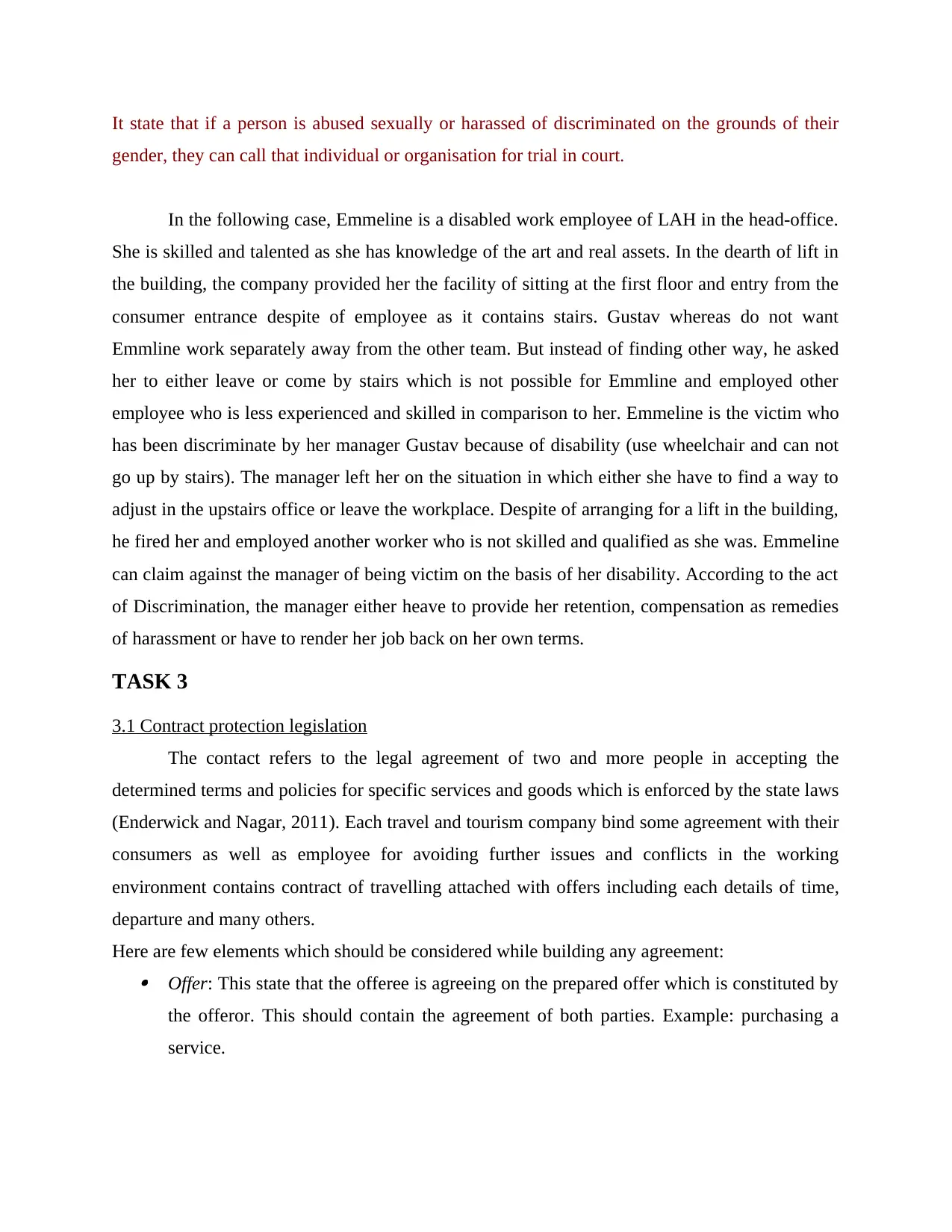
It state that if a person is abused sexually or harassed of discriminated on the grounds of their
gender, they can call that individual or organisation for trial in court.
In the following case, Emmeline is a disabled work employee of LAH in the head-office.
She is skilled and talented as she has knowledge of the art and real assets. In the dearth of lift in
the building, the company provided her the facility of sitting at the first floor and entry from the
consumer entrance despite of employee as it contains stairs. Gustav whereas do not want
Emmline work separately away from the other team. But instead of finding other way, he asked
her to either leave or come by stairs which is not possible for Emmline and employed other
employee who is less experienced and skilled in comparison to her. Emmeline is the victim who
has been discriminate by her manager Gustav because of disability (use wheelchair and can not
go up by stairs). The manager left her on the situation in which either she have to find a way to
adjust in the upstairs office or leave the workplace. Despite of arranging for a lift in the building,
he fired her and employed another worker who is not skilled and qualified as she was. Emmeline
can claim against the manager of being victim on the basis of her disability. According to the act
of Discrimination, the manager either heave to provide her retention, compensation as remedies
of harassment or have to render her job back on her own terms.
TASK 3
3.1 Contract protection legislation
The contact refers to the legal agreement of two and more people in accepting the
determined terms and policies for specific services and goods which is enforced by the state laws
(Enderwick and Nagar, 2011). Each travel and tourism company bind some agreement with their
consumers as well as employee for avoiding further issues and conflicts in the working
environment contains contract of travelling attached with offers including each details of time,
departure and many others.
Here are few elements which should be considered while building any agreement: Offer: This state that the offeree is agreeing on the prepared offer which is constituted by
the offeror. This should contain the agreement of both parties. Example: purchasing a
service.
gender, they can call that individual or organisation for trial in court.
In the following case, Emmeline is a disabled work employee of LAH in the head-office.
She is skilled and talented as she has knowledge of the art and real assets. In the dearth of lift in
the building, the company provided her the facility of sitting at the first floor and entry from the
consumer entrance despite of employee as it contains stairs. Gustav whereas do not want
Emmline work separately away from the other team. But instead of finding other way, he asked
her to either leave or come by stairs which is not possible for Emmline and employed other
employee who is less experienced and skilled in comparison to her. Emmeline is the victim who
has been discriminate by her manager Gustav because of disability (use wheelchair and can not
go up by stairs). The manager left her on the situation in which either she have to find a way to
adjust in the upstairs office or leave the workplace. Despite of arranging for a lift in the building,
he fired her and employed another worker who is not skilled and qualified as she was. Emmeline
can claim against the manager of being victim on the basis of her disability. According to the act
of Discrimination, the manager either heave to provide her retention, compensation as remedies
of harassment or have to render her job back on her own terms.
TASK 3
3.1 Contract protection legislation
The contact refers to the legal agreement of two and more people in accepting the
determined terms and policies for specific services and goods which is enforced by the state laws
(Enderwick and Nagar, 2011). Each travel and tourism company bind some agreement with their
consumers as well as employee for avoiding further issues and conflicts in the working
environment contains contract of travelling attached with offers including each details of time,
departure and many others.
Here are few elements which should be considered while building any agreement: Offer: This state that the offeree is agreeing on the prepared offer which is constituted by
the offeror. This should contain the agreement of both parties. Example: purchasing a
service.
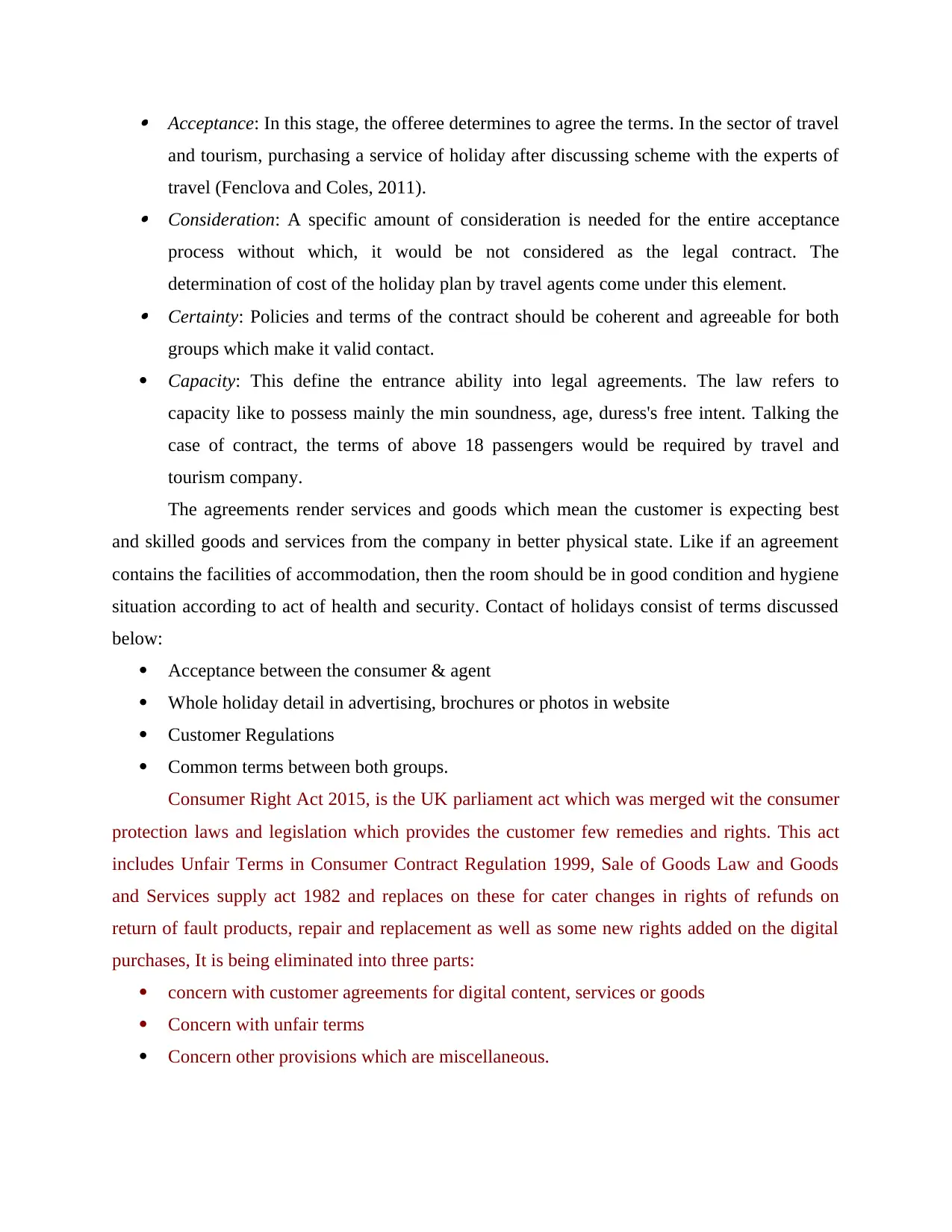
Acceptance: In this stage, the offeree determines to agree the terms. In the sector of travel
and tourism, purchasing a service of holiday after discussing scheme with the experts of
travel (Fenclova and Coles, 2011). Consideration: A specific amount of consideration is needed for the entire acceptance
process without which, it would be not considered as the legal contract. The
determination of cost of the holiday plan by travel agents come under this element. Certainty: Policies and terms of the contract should be coherent and agreeable for both
groups which make it valid contact.
Capacity: This define the entrance ability into legal agreements. The law refers to
capacity like to possess mainly the min soundness, age, duress's free intent. Talking the
case of contract, the terms of above 18 passengers would be required by travel and
tourism company.
The agreements render services and goods which mean the customer is expecting best
and skilled goods and services from the company in better physical state. Like if an agreement
contains the facilities of accommodation, then the room should be in good condition and hygiene
situation according to act of health and security. Contact of holidays consist of terms discussed
below:
Acceptance between the consumer & agent
Whole holiday detail in advertising, brochures or photos in website
Customer Regulations
Common terms between both groups.
Consumer Right Act 2015, is the UK parliament act which was merged wit the consumer
protection laws and legislation which provides the customer few remedies and rights. This act
includes Unfair Terms in Consumer Contract Regulation 1999, Sale of Goods Law and Goods
and Services supply act 1982 and replaces on these for cater changes in rights of refunds on
return of fault products, repair and replacement as well as some new rights added on the digital
purchases, It is being eliminated into three parts:
concern with customer agreements for digital content, services or goods
Concern with unfair terms
Concern other provisions which are miscellaneous.
and tourism, purchasing a service of holiday after discussing scheme with the experts of
travel (Fenclova and Coles, 2011). Consideration: A specific amount of consideration is needed for the entire acceptance
process without which, it would be not considered as the legal contract. The
determination of cost of the holiday plan by travel agents come under this element. Certainty: Policies and terms of the contract should be coherent and agreeable for both
groups which make it valid contact.
Capacity: This define the entrance ability into legal agreements. The law refers to
capacity like to possess mainly the min soundness, age, duress's free intent. Talking the
case of contract, the terms of above 18 passengers would be required by travel and
tourism company.
The agreements render services and goods which mean the customer is expecting best
and skilled goods and services from the company in better physical state. Like if an agreement
contains the facilities of accommodation, then the room should be in good condition and hygiene
situation according to act of health and security. Contact of holidays consist of terms discussed
below:
Acceptance between the consumer & agent
Whole holiday detail in advertising, brochures or photos in website
Customer Regulations
Common terms between both groups.
Consumer Right Act 2015, is the UK parliament act which was merged wit the consumer
protection laws and legislation which provides the customer few remedies and rights. This act
includes Unfair Terms in Consumer Contract Regulation 1999, Sale of Goods Law and Goods
and Services supply act 1982 and replaces on these for cater changes in rights of refunds on
return of fault products, repair and replacement as well as some new rights added on the digital
purchases, It is being eliminated into three parts:
concern with customer agreements for digital content, services or goods
Concern with unfair terms
Concern other provisions which are miscellaneous.
⊘ This is a preview!⊘
Do you want full access?
Subscribe today to unlock all pages.

Trusted by 1+ million students worldwide
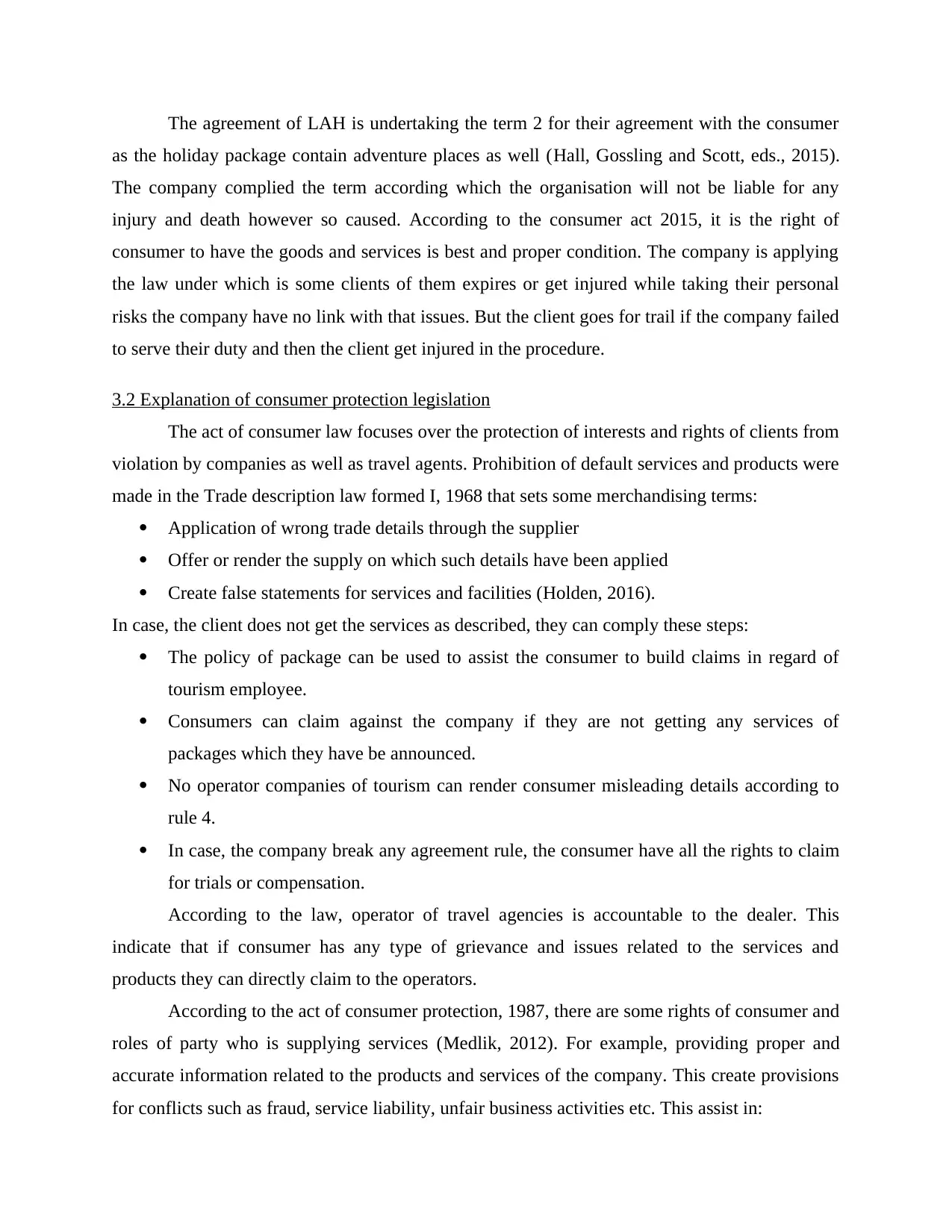
The agreement of LAH is undertaking the term 2 for their agreement with the consumer
as the holiday package contain adventure places as well (Hall, Gossling and Scott, eds., 2015).
The company complied the term according which the organisation will not be liable for any
injury and death however so caused. According to the consumer act 2015, it is the right of
consumer to have the goods and services is best and proper condition. The company is applying
the law under which is some clients of them expires or get injured while taking their personal
risks the company have no link with that issues. But the client goes for trail if the company failed
to serve their duty and then the client get injured in the procedure.
3.2 Explanation of consumer protection legislation
The act of consumer law focuses over the protection of interests and rights of clients from
violation by companies as well as travel agents. Prohibition of default services and products were
made in the Trade description law formed I, 1968 that sets some merchandising terms:
Application of wrong trade details through the supplier
Offer or render the supply on which such details have been applied
Create false statements for services and facilities (Holden, 2016).
In case, the client does not get the services as described, they can comply these steps:
The policy of package can be used to assist the consumer to build claims in regard of
tourism employee.
Consumers can claim against the company if they are not getting any services of
packages which they have be announced.
No operator companies of tourism can render consumer misleading details according to
rule 4.
In case, the company break any agreement rule, the consumer have all the rights to claim
for trials or compensation.
According to the law, operator of travel agencies is accountable to the dealer. This
indicate that if consumer has any type of grievance and issues related to the services and
products they can directly claim to the operators.
According to the act of consumer protection, 1987, there are some rights of consumer and
roles of party who is supplying services (Medlik, 2012). For example, providing proper and
accurate information related to the products and services of the company. This create provisions
for conflicts such as fraud, service liability, unfair business activities etc. This assist in:
as the holiday package contain adventure places as well (Hall, Gossling and Scott, eds., 2015).
The company complied the term according which the organisation will not be liable for any
injury and death however so caused. According to the consumer act 2015, it is the right of
consumer to have the goods and services is best and proper condition. The company is applying
the law under which is some clients of them expires or get injured while taking their personal
risks the company have no link with that issues. But the client goes for trail if the company failed
to serve their duty and then the client get injured in the procedure.
3.2 Explanation of consumer protection legislation
The act of consumer law focuses over the protection of interests and rights of clients from
violation by companies as well as travel agents. Prohibition of default services and products were
made in the Trade description law formed I, 1968 that sets some merchandising terms:
Application of wrong trade details through the supplier
Offer or render the supply on which such details have been applied
Create false statements for services and facilities (Holden, 2016).
In case, the client does not get the services as described, they can comply these steps:
The policy of package can be used to assist the consumer to build claims in regard of
tourism employee.
Consumers can claim against the company if they are not getting any services of
packages which they have be announced.
No operator companies of tourism can render consumer misleading details according to
rule 4.
In case, the company break any agreement rule, the consumer have all the rights to claim
for trials or compensation.
According to the law, operator of travel agencies is accountable to the dealer. This
indicate that if consumer has any type of grievance and issues related to the services and
products they can directly claim to the operators.
According to the act of consumer protection, 1987, there are some rights of consumer and
roles of party who is supplying services (Medlik, 2012). For example, providing proper and
accurate information related to the products and services of the company. This create provisions
for conflicts such as fraud, service liability, unfair business activities etc. This assist in:
Paraphrase This Document
Need a fresh take? Get an instant paraphrase of this document with our AI Paraphraser
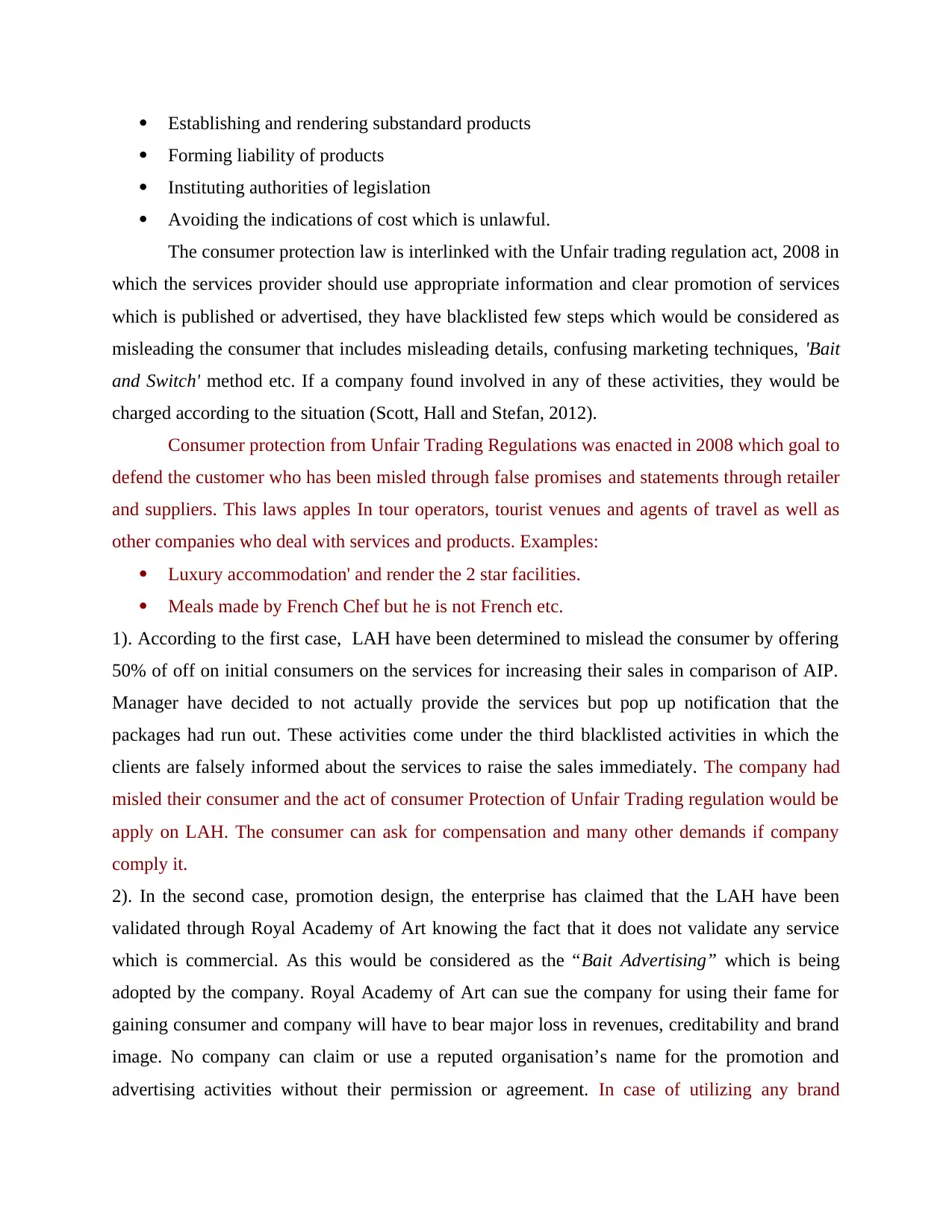
Establishing and rendering substandard products
Forming liability of products
Instituting authorities of legislation
Avoiding the indications of cost which is unlawful.
The consumer protection law is interlinked with the Unfair trading regulation act, 2008 in
which the services provider should use appropriate information and clear promotion of services
which is published or advertised, they have blacklisted few steps which would be considered as
misleading the consumer that includes misleading details, confusing marketing techniques, 'Bait
and Switch' method etc. If a company found involved in any of these activities, they would be
charged according to the situation (Scott, Hall and Stefan, 2012).
Consumer protection from Unfair Trading Regulations was enacted in 2008 which goal to
defend the customer who has been misled through false promises and statements through retailer
and suppliers. This laws apples In tour operators, tourist venues and agents of travel as well as
other companies who deal with services and products. Examples:
Luxury accommodation' and render the 2 star facilities.
Meals made by French Chef but he is not French etc.
1). According to the first case, LAH have been determined to mislead the consumer by offering
50% of off on initial consumers on the services for increasing their sales in comparison of AIP.
Manager have decided to not actually provide the services but pop up notification that the
packages had run out. These activities come under the third blacklisted activities in which the
clients are falsely informed about the services to raise the sales immediately. The company had
misled their consumer and the act of consumer Protection of Unfair Trading regulation would be
apply on LAH. The consumer can ask for compensation and many other demands if company
comply it.
2). In the second case, promotion design, the enterprise has claimed that the LAH have been
validated through Royal Academy of Art knowing the fact that it does not validate any service
which is commercial. As this would be considered as the “Bait Advertising” which is being
adopted by the company. Royal Academy of Art can sue the company for using their fame for
gaining consumer and company will have to bear major loss in revenues, creditability and brand
image. No company can claim or use a reputed organisation’s name for the promotion and
advertising activities without their permission or agreement. In case of utilizing any brand
Forming liability of products
Instituting authorities of legislation
Avoiding the indications of cost which is unlawful.
The consumer protection law is interlinked with the Unfair trading regulation act, 2008 in
which the services provider should use appropriate information and clear promotion of services
which is published or advertised, they have blacklisted few steps which would be considered as
misleading the consumer that includes misleading details, confusing marketing techniques, 'Bait
and Switch' method etc. If a company found involved in any of these activities, they would be
charged according to the situation (Scott, Hall and Stefan, 2012).
Consumer protection from Unfair Trading Regulations was enacted in 2008 which goal to
defend the customer who has been misled through false promises and statements through retailer
and suppliers. This laws apples In tour operators, tourist venues and agents of travel as well as
other companies who deal with services and products. Examples:
Luxury accommodation' and render the 2 star facilities.
Meals made by French Chef but he is not French etc.
1). According to the first case, LAH have been determined to mislead the consumer by offering
50% of off on initial consumers on the services for increasing their sales in comparison of AIP.
Manager have decided to not actually provide the services but pop up notification that the
packages had run out. These activities come under the third blacklisted activities in which the
clients are falsely informed about the services to raise the sales immediately. The company had
misled their consumer and the act of consumer Protection of Unfair Trading regulation would be
apply on LAH. The consumer can ask for compensation and many other demands if company
comply it.
2). In the second case, promotion design, the enterprise has claimed that the LAH have been
validated through Royal Academy of Art knowing the fact that it does not validate any service
which is commercial. As this would be considered as the “Bait Advertising” which is being
adopted by the company. Royal Academy of Art can sue the company for using their fame for
gaining consumer and company will have to bear major loss in revenues, creditability and brand
image. No company can claim or use a reputed organisation’s name for the promotion and
advertising activities without their permission or agreement. In case of utilizing any brand
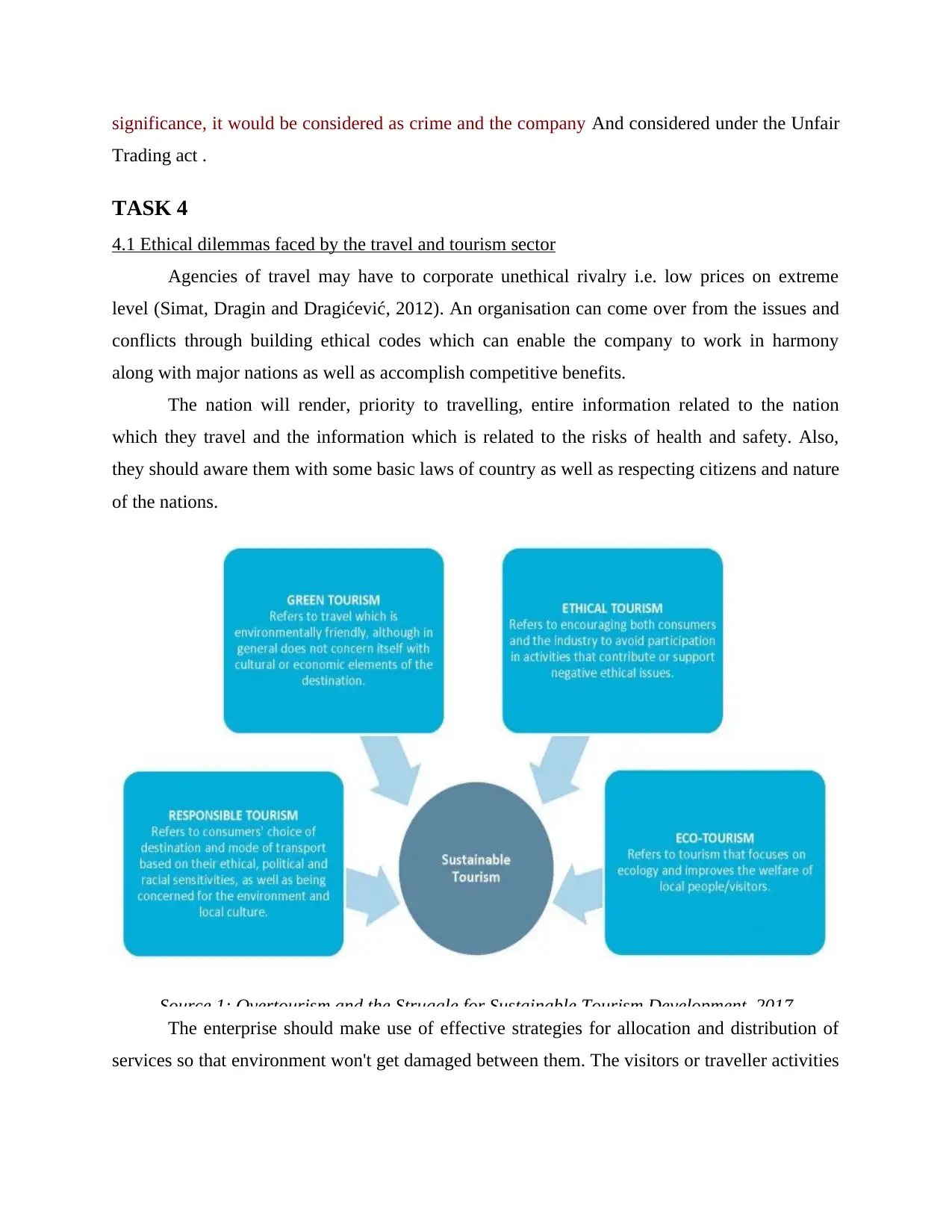
significance, it would be considered as crime and the company And considered under the Unfair
Trading act .
TASK 4
4.1 Ethical dilemmas faced by the travel and tourism sector
Agencies of travel may have to corporate unethical rivalry i.e. low prices on extreme
level (Simat, Dragin and Dragićević, 2012). An organisation can come over from the issues and
conflicts through building ethical codes which can enable the company to work in harmony
along with major nations as well as accomplish competitive benefits.
The nation will render, priority to travelling, entire information related to the nation
which they travel and the information which is related to the risks of health and safety. Also,
they should aware them with some basic laws of country as well as respecting citizens and nature
of the nations.
Source 1: Overtourism and the Struggle for Sustainable Tourism Development, 2017
The enterprise should make use of effective strategies for allocation and distribution of
services so that environment won't get damaged between them. The visitors or traveller activities
Trading act .
TASK 4
4.1 Ethical dilemmas faced by the travel and tourism sector
Agencies of travel may have to corporate unethical rivalry i.e. low prices on extreme
level (Simat, Dragin and Dragićević, 2012). An organisation can come over from the issues and
conflicts through building ethical codes which can enable the company to work in harmony
along with major nations as well as accomplish competitive benefits.
The nation will render, priority to travelling, entire information related to the nation
which they travel and the information which is related to the risks of health and safety. Also,
they should aware them with some basic laws of country as well as respecting citizens and nature
of the nations.
Source 1: Overtourism and the Struggle for Sustainable Tourism Development, 2017
The enterprise should make use of effective strategies for allocation and distribution of
services so that environment won't get damaged between them. The visitors or traveller activities
⊘ This is a preview!⊘
Do you want full access?
Subscribe today to unlock all pages.

Trusted by 1+ million students worldwide
1 out of 16
Related Documents
Your All-in-One AI-Powered Toolkit for Academic Success.
+13062052269
info@desklib.com
Available 24*7 on WhatsApp / Email
![[object Object]](/_next/static/media/star-bottom.7253800d.svg)
Unlock your academic potential
Copyright © 2020–2025 A2Z Services. All Rights Reserved. Developed and managed by ZUCOL.




